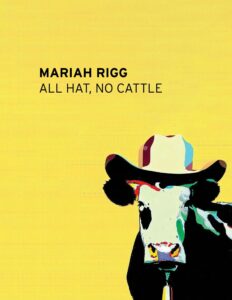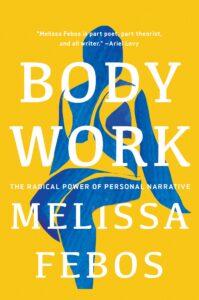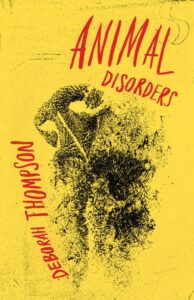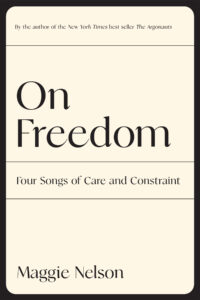Reviewed by Sarah Harshbarger | August 8, 2023
Bull City Press, 2023
Paperback, $4.99
Mariah Rigg’s chapbook All Hat, No Cattle is a masterclass in “Compressions,” the title of its fifth micro-essay. The collection moves easily through time and space, using vivid images and keen observations as modes of transport. The title comes from the narrator’s partner, amused by the sight of a Texan boy wearing a cowboy hat and Ray-Bans behind the tinted windows of a GMC Sierra. He calls out the window, All hat, no cattle, but only the narrator hears. As the teasing reminds the narrator of a childhood memory, we travel there with her: “We’d play this game: Dad drove slow; I’d yell at people walking the sidewalk. One day I yelled at a woman and she jumped. She fell over, and that’s when we saw her from the front. That’s when we found out she was pregnant.” Moments like this, complications in memory, are jumping-off points for Rigg to examine how the narrator has been shaped by her past lives. Within a single essay, we might occupy the past, present, and future–and yet, we remain grounded in the physical world, where we sit “watching the leaves of the apple tree dance emerald in the sun’s last fingers.”
Rigg also demonstrates “compression” by establishing recurring images and motifs that pull thematic threads through the work–all in less than twenty pages. In “Linger,” the narrator’s partner and his roommate set traps to solve a rat problem, but they forget about the traps, which “got lost in the walls. They caught a rat, and it rotted.” “Rot” represents a lack of care–one of the greatest threats in stories about connection-keeping, about ties to home. Later, in another essay and another setting, “rot” returns as the narrator describes the care she takes with her green onions. “I change their water every day so they don’t rot,” Rigg writes, and in this precaution we see both something consistent, and something learned. Without ever feeling forced or obtrusive, these call-backs highlight the converging themes across the essays, “compressing” their varied experiences into a harmonic whole.
Important places in the collection include Tennessee, Texas, Oregon, and Hawai’i. It’s a collection about home, especially finding and making home in unexpected places, growing green onions on the windowsill, gathering flowers as the speaker’s “shell collection on O’ahu gathers dust.” But the places in these essays also tell a story of love, a particular love, one complicated and strengthened by history and distance. Many stories, fictional or not, avoid confronting love head-on, insist on implying feeling and summarizing the sentimental. But Rigg allows her narrator the full spectrum of romantic emotion, the early wanting, the fragile happiness, and finally, the long-distance yearning. The narrator’s longing for C after moving away from the place where they met is a story in itself, but it also represents the underlying question of the collection, the homesick wondering “what would have happened if we’d had a little more time.”
It would make sense for a collection about longing and homesickness to be heavy, even oppressive, but Rigg’s chapbook lets light filter in in unexpected ways, leaving us with the feeling that as our lives change and we leave things behind, joy perseveres. Rigg writes, “Here I am, in Eugene, trying to write something gut-punching, but mostly falling in love with the way you twist your hands and look at me after we’re done fucking, your face whispering I love you even as your mouth says That was fun.” Both Rigg and her narrator seem to understand that life lived is as important to memoir as books studied, as hours at the desk. All Hat, No Cattle buzzes with life, with friendship, with sex, with cooking.
When the collection does explore dark corners, however, it is, as the narrator hopes, “something gut-punching.” The same essay ends with an image of meat grilled to a char, “[s]omething chewed up and burnt inside me.”The narrator looks ahead to the lack she will feel when she and her partner are separated, describes how she will make that lack apparent to others by not washing, by stealing apples, by eating flesh to scare her vegan roommate. In “Compressions,” Rigg writes, “as my name grows too small to be held in the mouths of those who loved me as a child, I gather violets.” This is only one of many moments that put words to the grief of leaving home, the weight of moving on. But like the collection as a whole, this moment also demonstrates a kind of resistance to that weight–a determination to care.
ABOUT THE AUTHOR
Originally from Honolulu, Hawai‘i, Mariah Rigg is a Samoan-Haole writer and educator with a penchant for heartbreak. She has an MFA from the University of Oregon and is currently a PhD student at the University of Tennessee in Knoxville. Her work has received support from VCCA and Oregon Literary Arts, and is published or is forthcoming in Oxford American, Cincinnati Review, Joyland, and elsewhere. She is a fiction editor at TriQuarterly and the nonfiction editor at Grist: A Journal of the Literary Arts.
ABOUT THE REVIEWER
Sarah Harshbarger is a PhD candidate at the University of Tennessee, Knoxville. She currently serves as editor-in-chief of Grist: A Journal of the Literary Arts. Their stories have appeared in Hayden’s Ferry Review, Passages North, The Sewanee Review, West Branch, and elsewhere.






